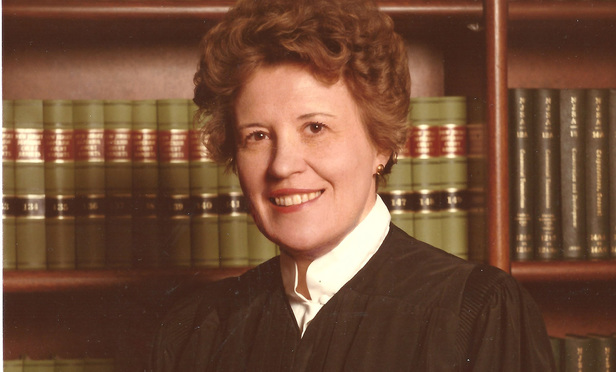The bar and bench of New Jersey mourn the death of Justice Marie L. Garibaldi last week. Well known as the first female president of the New Jersey State Bar Association and first female justice on the New Jersey Supreme Court, she was also an accomplished tax attorney and a pioneer of the alternate dispute resolution process. More privately, she was known to embody the epitome of grace as a devoted daughter and family member, and mentor to the 46 clerks who served with her between her appointment to the Court in 1982 and her retirement in 2000. Her work and personality resulted in many honors including the cherished Columbia Law School Medal of Excellence.
Perhaps the most conservative member of the Wilentz Court, Justice Garibaldi was known for being fair and balanced, and not result-oriented. She wrote significant ground-breaking opinions for the Court, and applied equitable and legal principles to provide the results warranted by the individual facts and circumstances of the case then before the Court, as well as appropriate public policy where necessary to protect public values. Among her 233 majority opinions, she applied equitable estoppel to prevent an employer from terminating health benefits; upheld the death sentence of Jesse Timmendequas for the death of seven-year old Megan Kanka during a sexual assault, leading to the passage of Megan’s Law; wrote the opinions limiting the scope of review in family and domestic violence proceedings, and limiting disparity in plea offers among county prosecutors; read an obligation of good faith and fair dealing into contract disputes, and recognized an employer’s responsibility for a hostile work environment and sexual harassment by a employee’s supervisor. As an independent thinker, Justice Garibaldi filed 63 dissents and 18 concurring opinions disagreeing with the majority on issues of major significance, including one in Abbott v. Burke, believing that the Comprehensive Educational Improvement and Financing Act of 1996 was constitutional because it gave each child an equal educational opportunity by creating educational standards and that equal per-student expenditures were not constitutionally necessary. She advocated preemption in product-warning cases, was conservative in creating state common law causes of action such as for emotional distress damages when a family member observed the results of medical malpractice, and felt that the similar language of the state constitution did not warrant greater protection than the federal. She believed it was for the Legislature, and not the Court, to create social policy such as host liability. She showed compassion and would allow use of marijuana for medical reasons involving an extremely sick person and would permit a private individual to protect his reputation by a standard of proof less than actual malice.
This content has been archived. It is available through our partners, LexisNexis® and Bloomberg Law.
To view this content, please continue to their sites.
Not a Lexis Subscriber?
Subscribe Now
Not a Bloomberg Law Subscriber?
Subscribe Now
LexisNexis® and Bloomberg Law are third party online distributors of the broad collection of current and archived versions of ALM's legal news publications. LexisNexis® and Bloomberg Law customers are able to access and use ALM's content, including content from the National Law Journal, The American Lawyer, Legaltech News, The New York Law Journal, and Corporate Counsel, as well as other sources of legal information.
For questions call 1-877-256-2472 or contact us at [email protected]



